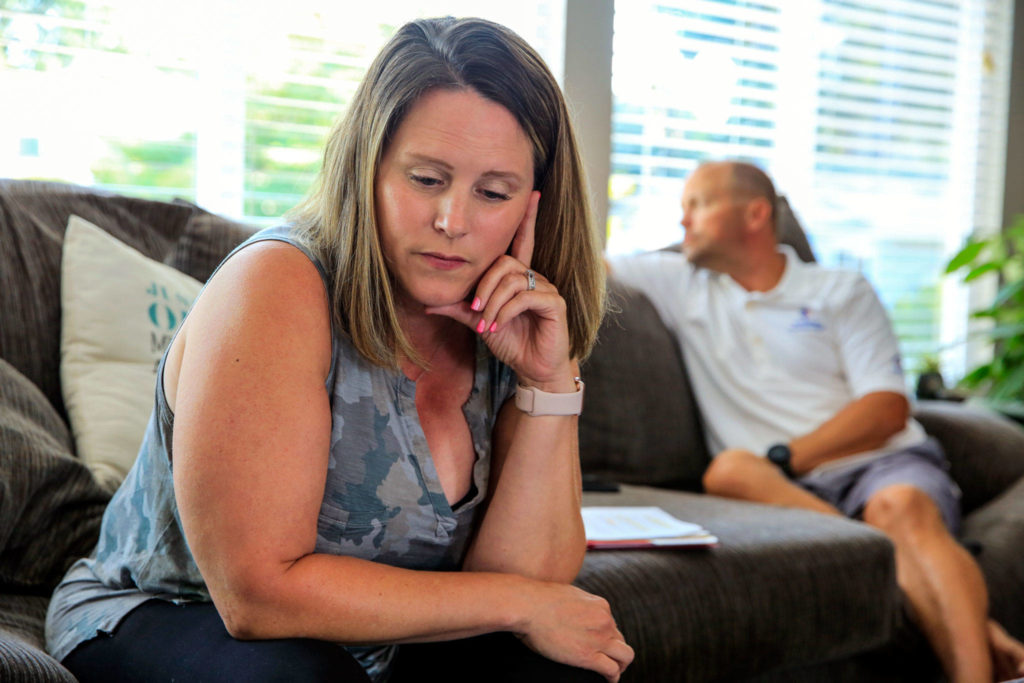Kristin Christensen is a military veteran’s wife. She’s a mother and new grandmother. She’s working on a degree through the University of Washington. This summer she earned a new title: Dole Caregiver Fellow.
Bestowed by the Elizabeth Dole Foundation, it’s an honor recognizing one of her most critical roles. She is the full-time caregiver for her husband, Michael Christensen.
At 44, he’s a retired Navy Seabee whose goal was to spend his entire career in military service.
“I was in the military almost half my life, it was my heart and soul. I wanted to stay,” said Michael, who joined the service in 1996. His plans were dashed by what he suffered during his 2006-2007 deployment to Iraq.
In the couple’s home near Mill Creek, they spoke Thursday of life since he was hit — twice in 10 days — by roadside bombs known as improvised explosive devices. In a separate incident, he was violently struck on the head as he was ejected from his gun turret.
While he has “some shrapnel scars,” Kristin said her husband has “mostly invisible injuries.”
Those unseen injuries have been life-altering — for both of them.
Michael Christensen has traumatic brain injury, post-traumatic stress disorder, arm and shoulder damage, two broken ribs he said didn’t heal properly, severe headaches, trouble sleeping, and neck and back issues that have worsened over the years.
The couple married in 2013. By the end of that year, his long process of medical retirement from the military was completed. Every three months, he sees a neurologist at the Seattle VA Medical Center, though during the pandemic those appointments have mostly been virtual.
Kristin, also 44, receives a monthly stipend through the U.S. Department of Veterans Affairs’ Program of Comprehensive Assistance for Family Caregivers.
Once a project manager who worked in downtown Seattle, she said becoming her husband’s caregiver “was not a linear path.” She tried another job, with a shorter commute. But with parenting and her husband’s needs, “I needed to be home,” she said.
A caseworker at the VA suggested she look into the agency’s family caregiver program. While Kristin said she didn’t think it was necessary at the time, “it became apparent.”
The Christensens have two children at home, a 14-year-old girl and a 5-year-old boy. They’re also parents to a 25-year-old son and grandparents to a year-old granddaughter.
At a retreat in Renton, Kristen heard about the Dole Caregiver Fellows program. Through an application and interview, she was chosen for the program’s class of 2021. She’s one of 11 from around the country who’ll represent those caring for a wounded, ill or injured U.S. service member or veteran at home.
Among other 2021 fellows are those who help veterans suffering from the effects of Agent Orange, or from service injuries compounded by Alzheimer’s disease and dementia, according to Steve Schwab, CEO of the Elizabeth Dole Foundation.
The fellows are encouraged to share their challenges with government leaders, the VA, businesses and faith groups. Former Sen. Elizabeth Dole created the foundation in 2012 to raise awareness of an estimated 5.5 million spouses, parents and other loved ones caring for veterans at home. Her husband, retired Sen. Bob Dole, is an Army veteran injured in World War II.
Kristin wants to further the work of the foundation’s Hidden Heroes Cities and Counties program, which aims to establish networks to help streamline services to military caregivers. She’d like Snohomish County to become a Hidden Heroes locale.
Along with overseeing everything from her husband’s medications and appointments to his mood management, Kristin has been entangled in a years-long financial mess. They’ve been challenging a $60,000 bill which she said is related to a mix-up between the Department of Defense and the Department of Veterans Affairs in processing her husband’s benefits.
The issue is partly resolved, she said, thanks to help from Congresswoman Suzan DelBene, Congressman Rick Larsen, and state Rep. John Lovick. If she hadn’t been there to help with the red tape, Kristin believes Michael might have become a homeless veteran.
With a goal of helping others transition from active duty, she hopes to attend law school after finishing her Integrated Social Science degree at UW.
Through it all, they carry on.
There’s an artificial-turf putting green in the couple’s backyard, a place where Michael can get away from life’s stresses. He works out with a personal trainer who created a regimen with his injuries in mind.
At times, triggers take him back to another time and place. Fireworks, crowded places, the smell of sulphur, and driving over a manhole cover or under an overpass can put him into high alert.
The PTSD “doesn’t give you any patience at all,” said Michael. Parenting sometimes involves “lots of deep breaths.”
He’s involved in Tee It Up for the Troops, a nonprofit golf organization that helps veterans transition to the homefront. And he’s been in touch with others from his convoy in Iraq.
“The day-to-day stuff is not bad. The first step was accepting the fact that I wasn’t in the military anymore,” said Michael, whose duties took him to Navy facilities in Port Hueneme, California, Whidbey Island, Everett and elsewhere.
Michael said his wife keeps him focused, and for her unceasing love and care, “I’m very lucky.”
Julie Muhlstein: jmuhlstein@heraldnet.com
Talk to us
> Give us your news tips.
> Send us a letter to the editor.
> More Herald contact information.



























